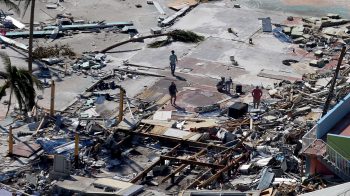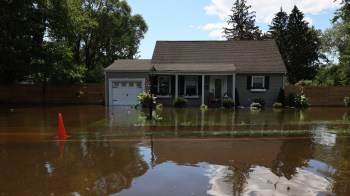Disaster spending breaks records
Bob Moon: It just grew from a tropical storm into a hurricane. Irene is its name, and it may have an eye on Florida. For now, the Bahamas are in the hurricane’s path. But a tiny tilt west could put it over the Sunshine State by the end of the week.
It’s already been a record year for extreme weather in the U.S. — and likewise for the resulting damages. That means state and federal coffers are already low, just as hurricane season ramps up. From the Marketplace Sustainability Desk, Eve Troeh reports.
Eve Troeh: Hollywood blockbusters that spend millions to re-create disasters have nothing on the reality of 2011. We’ve seen $9 billion-disasters in the U.S. this year. $35 billion in total damage from blizzards, tornadoes, floods, drought and fires, says the National Oceanic and Atmospheric Administration. And states have come to expect federal help, says disaster consultant Eric Holdeman.
Eric Holdeman: Over time, just the average flood has become eligible for a Presidential Declaration.
That declaration triggers help from FEMA, the federal emergency management agency. It pays for every kind of disaster — terrorism to droughts — with one pool of money. When the pool runs dry, it asks Congress for more. That’s an easy ask for a major hurricane or earthquake, but Holdeman says Congress could start pushing back on lesser disasters.
Holdeman: Saying hey, you have the damages to your property, you’re responsible for ’em.
More individual responsibility at a time when more people have dropped insurance to save money.
Craig Fugate is administrator for FEMA. He says many catastrophes his agency pays for could have been predicted.
Craig Fugate: Yet it took the catastrophe to prompt action. We react to when the system fails, versus trying to look at it from a standpoint of how do we invest in a way that minimizes those impacts?
And, he doesn’t expect that to change. He says it’s hard to get federal funding to protect one state from a possible disaster, when the next big storm could hit somewhere else. Not to mention the predicted political storms over all federal spending when Congress returns next month.
I’m Eve Troeh for Marketplace.
There’s a lot happening in the world. Through it all, Marketplace is here for you.
You rely on Marketplace to break down the world’s events and tell you how it affects you in a fact-based, approachable way. We rely on your financial support to keep making that possible.
Your donation today powers the independent journalism that you rely on. For just $5/month, you can help sustain Marketplace so we can keep reporting on the things that matter to you.


















